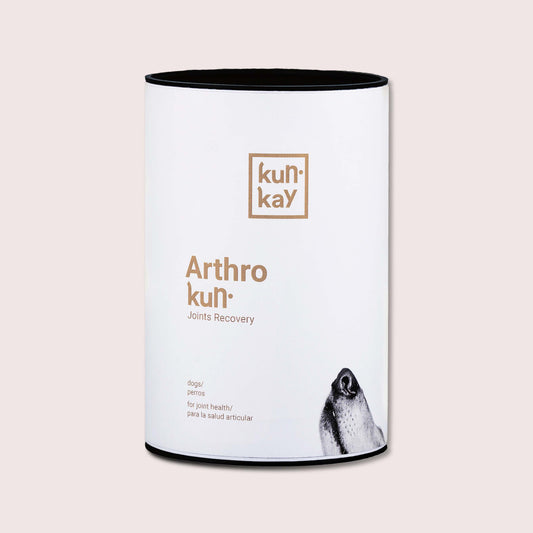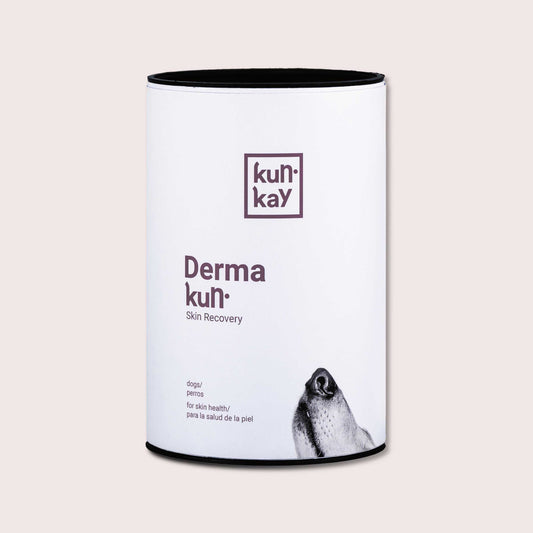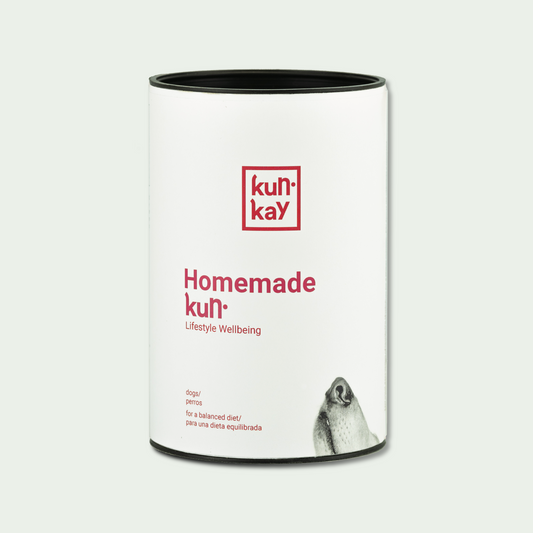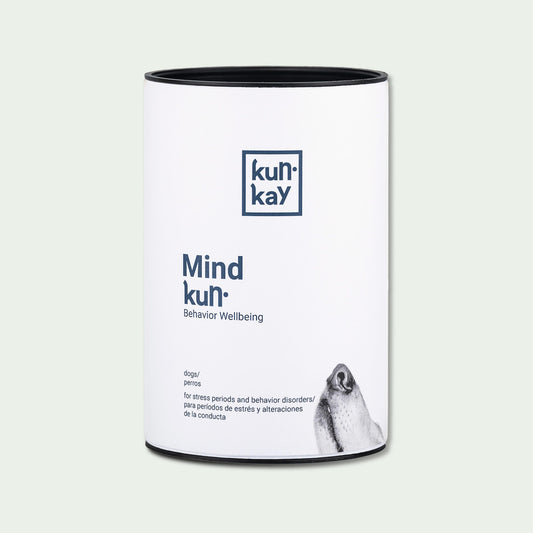Anti-inflammatory drugs for dogs. Are they safe? How effective are they?

Throughout their life, it is very likely that your dog will need to take anti-inflammatory drugs for dogs at some point. These drugs are used for different purposes; usually to reduce pain or inflammation from a blow, joint problem, or skin condition but also when dogs have a fever, undergo surgery, or suffer from a pathology when they are elderly such as canine osteoarthritis.

Of course, anti-inflammatory drugs for dogs are not the same as those we use for humans. They are equivalent to our Ibuprofen or Paracetamol but have been specially formulated for them. In fact, one of the best ways to give this type of medicine to our pets is by using vitamins and supplements for dogs that can be included in their daily food instead of having to opt for a pill.
At Kun-Kay, as specialists in natural supplements for pets, we have different supplements that can be used as a safe, healthy, and natural alternative to anti-inflammatory drugs for dogs with chemical formulations and/or pills.
In this article, we tell you everything you need to know about the use of this type of drug in dogs and the natural alternatives we recommend from Kun-Kay. Stay with us!
1. Use of non-steroidal anti-inflammatory drugs
Anti-inflammatory drugs are mainly divided into steroidal and non-steroidal. In the case of dogs and other small pets, corticosteroids and non-steroidal anti-inflammatory drugs (NSAIDs) are always used to treat all kinds of diseases that cause pain and inflammation. They are also used after surgeries as part of postoperative care and to reduce fevers.
Non-steroidal anti-inflammatory drugs usually have a stronger and faster action but also more negative short-term effects.
At Kun Kay, we have created a guide with the most common diseases in dogs to help you.
Corticosteroids, on the other hand, are less specific and can have more severe medium- to long-term effects as we will see below.
2. Are corticosteroids, or steroid anti-inflammatory drugs, dangerous?
Corticosteroids can be used at specific times as immunosuppressants or as anti-inflammatory drugs for dogs but their prolonged use is discouraged because they produce numerous long-term adverse effects, some of which are:

- Immunosuppression: This function can be beneficial at a given moment but in the long term predisposes the animal to suffer infections more frequently.
- Gastrointestinal ulcers
- Diabetes: Corticosteroids affect insulin action and can end up causing hyperglycemia.
- Cardiovascular problems.
- Delayed healing. Their use is not recommended after surgery or if there is an open wound.
- Renal effects.
- Behavioral changes, apathy.
- Effects on blood count, biochemistry, and coagulation.
3. When should I apply anti-inflammatory drugs to my dog? Can I give Ibuprofen or Paracetamol?
Anti-inflammatory drugs for dogs should only be used with a veterinarian’s recommendation. Under no circumstances should you give your dog human medicines, including Ibuprofen and Paracetamol.
Never administer medicines to your pet or leave your medications within their reach; you risk causing severe poisoning that could even lead to death.
4. Side effects of using anti-inflammatory drugs in dogs
 We have already seen that steroid anti-inflammatory drugs can cause numerous adverse effects and that their use is only recommended in very specific circumstances in favor of non-steroidal anti-inflammatory drugs.
We have already seen that steroid anti-inflammatory drugs can cause numerous adverse effects and that their use is only recommended in very specific circumstances in favor of non-steroidal anti-inflammatory drugs.
However, non-steroidal anti-inflammatory drugs are not free from side effects although the number of long-term problems is reduced.
The main problem with these anti-inflammatory drugs for dogs is that their continued use can end up affecting the dog’s gastrointestinal system. Specifically, there is a risk of gastrointestinal ulcers in the long term and among their temporary side effects are vomiting and diarrhea (Gastroenteritis in dogs: What is it?.)
Other side effects of non-steroidal anti-inflammatory drugs are a reduced platelet aggregation capacity and effects on the reproductive tract and fetus.
5. Are there natural anti-inflammatory drugs? What do we recommend at Kun-Kay?

If you are concerned about the adverse effects that traditional anti-inflammatory drugs may have on your pet, it is only logical to wonder if there are alternatives. There are! At Kun-Kay, we have two dog supplements that have an anti-inflammatory effect. Like all our products, they are made with 100% natural ingredients and are very easy to incorporate into your dog’s diet. You just have to add them to their food bowl and that’s it. Also, dogs love their taste!
We tell you which of our supplements we recommend if you are looking for a natural substitute for anti-inflammatory drugs for dogs:
- Arthrokun: This supplement helps reduce joint discomfort in your dog and prevent its appearance. It is especially recommended for older animals, overweight dogs, or those with high physical activity.
- Dermakun: The go-to supplement to care for your pet’s skin and coat. It is ideal for reducing itching, redness, and skin inflammation. Additionally, it has a healing function.
Besides Arthrokun and Dermakun, we also recommend trying Homadekun, the go-to supplement to provide your dog with all the vitamins and minerals needed to live healthy and happy.





